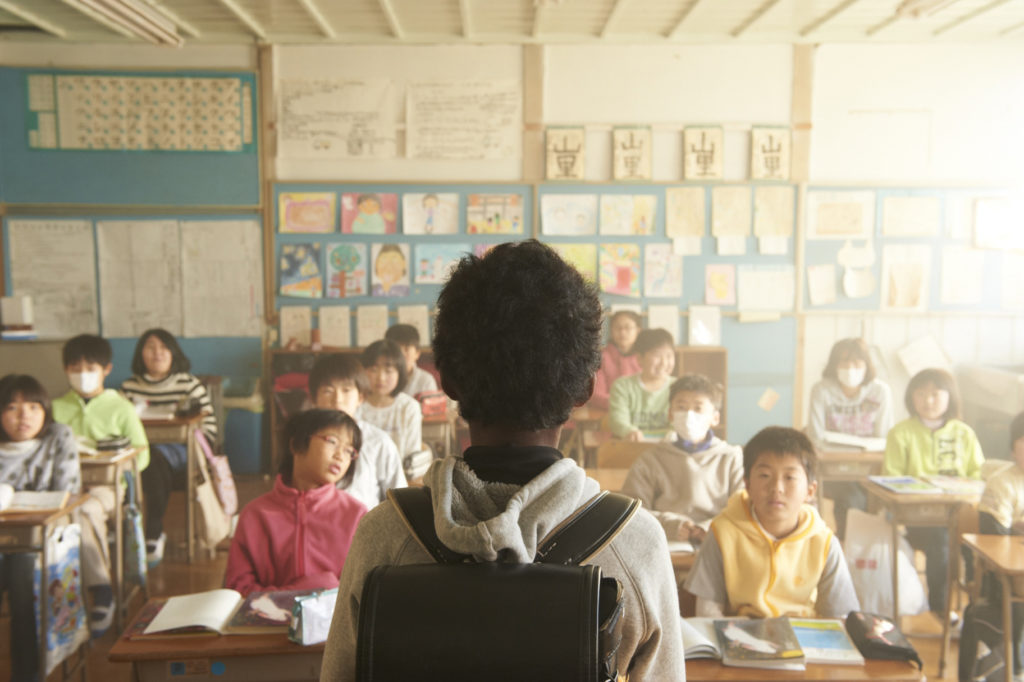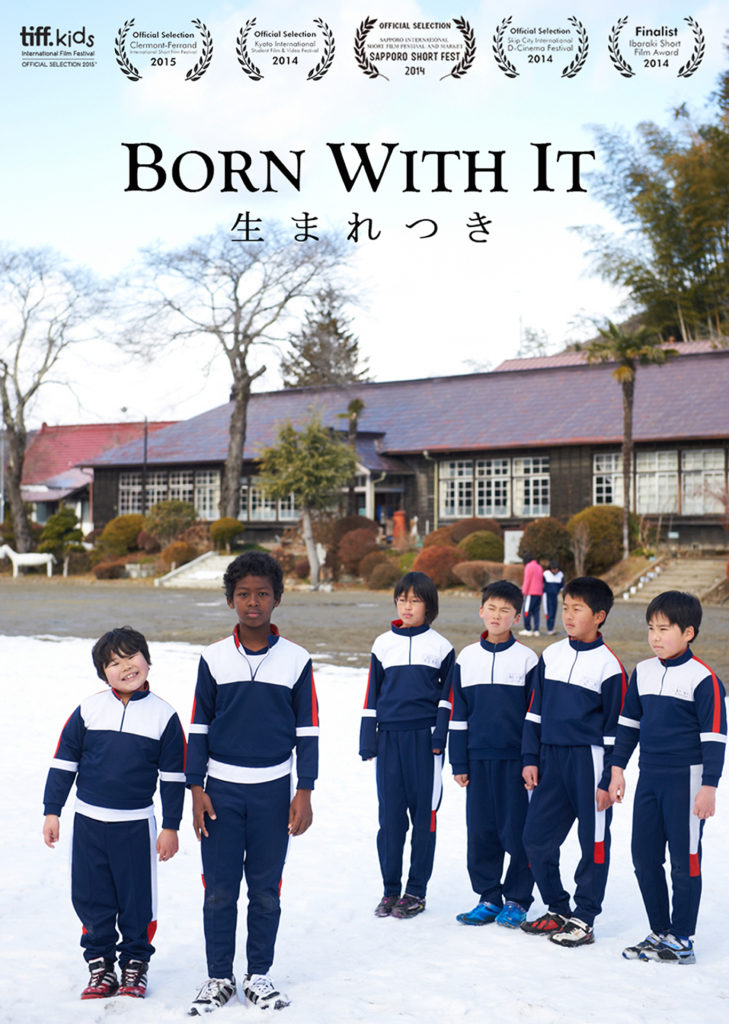While race relations in the United States seem to be tenser than ever, Japan is coming to a crossroads with accepting mixed race Japanese and immigrants into their mostly homogenous society. Japan is a welcoming country to foreigners, especially if you are a temporary visitor. The subtle prejudices only become visible to a foreigner once you have lived here for a while and experienced the day to day difficulties you face as an outsider when you actually try to become part of the society. Any foreigner in Japan who has been turned away from renting an apartment simply because they’re not Japanese, knows that experience.
An American filmmaker, Emmanuel Osei-Kuffour, from Texas, depicts this struggle to be accepted as a dark skinned black man in Japan in his award winning short film Born With It(生まれつき). Osei-Kuffour lived in Japan for six years, encountering numerous instances of prejudice and discrimination. The film follows a black elementary school child in Japan experiencing the cruelty of racism and harsh words spoken unfiltered in the world of children, who have not learned the impact of what they are doing or saying, or how to accept difference.
Osei-Kuffour notes “I wanted to tell the story from a kid’s point-of-view because I think its powerful to see someone’s innocence broken for the first time. This is ultimately a story about prejudice and it’s also disarming to see a child unaware of the scars of the adult world. Like most forms of discrimination, the most difficult moments I had in Japan are hard to convey convincingly. Most of the issues I encountered seemed to revolve around me, as a foreigner, not being perceived as an equal, normal human being. There always seemed to be the sense that since I was not Japanese, I would be unable to comprehend Japanese ideas or values, represent my given company in a meeting or share a space with other Japanese people.
Those moments seem small on paper but they begin to get under your skin when you’re trying to assimilate to the culture. I had — and still have — a strong desire to have a film career in Japan. So I’ve always wanted to live and work and get the same chances as my Japanese friends that were same age. But despite a strong command of the language, it became very clear to me that no matter how fluent I became, I had to either be famous outside of Japan or Japanese to really get the chances that I sought out in all Japanese environments. This is not the case for everyone but it is for most. ”
The seventeen minute film has resonated with many people in and outside of Japan, and garnered praise including The Best Film & Social Impact Award at the NBC-Universal Short Film Festival and Honorable Mention for Best Short Film at Toronto International Film Festival (Kids Section) and many more festivals.
“Born With It” will be airing on PBS KQED as part of the show “FILM SCHOOL SHORTS” in San Francisco 10/13 11pm.
Watch the trailer here.



Thank you. This was my life. I am a black american, was born in 1970 in Japan. Lived in Tokyo for 14 years. I attended Japanese school for K and grade 1. It was difficult. Ultimately ended up Nishimachi International school. I can relate to your story. Thanks again.
Liz, thanks for sharing with us. Would you like to write about your experience for the blog? We’d love to publish it.
I really really am looking forward to seeing this! Thank you for publishing this and thank you to the filmmakers and everyone involved.
Important stuff!
How might others be able to see this film?
I hope this film can aired in New England. What about WGBH Boston? We also have a film festival in June here on Nantucket Island which includes short films. You should apply.
[…] Having experienced prejudice and discrimination first hand during his six-year stay in the country, African-American filmmaker Emmanuel Osei-Kuffour, from Texas, chose to tackle the struggle of being accepted head-on by making a short film about it, according to Japan Subculture. […]
[…] Having experienced prejudice and discrimination first hand during his six-year stay in the country, African-American filmmaker Emmanuel Osei-Kuffour, from Texas, chose to tackle the struggle of being accepted head-on by making a short film about it, according to Japan Subculture. […]
I love this! I am a black man living in japan (and it might become my permanent home). My girlfriend and I really wanna watch this. It can help us with possible children in the future. Sadly we’re in Japan. Is there anyway to watch this from here? Online distribution or something?
We’re urging them to show it in Japan.
This is very true. I am Black and Chinese; looked down on for not “being Chinese” by many on the Chinese side of my family.
Powerful trailer. After years of raising kids in Japan, we left because of scenes like that (except we’re white). Our kids had been there so long that Japanese had become their primary language, but they had no memory of living in a place where they were accepted as equals. We really want to see the film.
Also living in Japan. As a black female, I would love to watch (or buy).
[…] here to read more from Mari […]
I’ve watched most of this film on YouTube and I AM NOT IMPRESSED. I’m mixed myself (black and white) and was born to an African American mother. One thing that gets under my skin is how Americans and other Westerners try to get other countries including homogeneous ones in Asia to be more like them. In other words, they “shine the light on ethnic issues in other countries” in order to force them to be as diverse as America or another Western nation. America is the last place on earth that should be criticizing another country on how they “treat their mixed race citizens.”
I can’t tell you how many times I’ve read comments from blacks, non Asians and even liberal Asians on how they feel that Asians “see blacks and those mixed with black.” Frankly, it’s disgusting. Some blacks even told me in person how “the world will see me because of my black half” including my own mother! For instance, I was told on at least several occasions sometimes more than once from the same person that I can only date certain races of men because of my ethnic background. One racist African family here in the states said my only options were basically black or white men because of who I am. An African American Muslim once had the nerve to tell me that an East Asian man would never introduce me to his family because of my black half. Then, she said if I wanna date an Asian man, go for Southeast Asians like Filipinos or Indonesians. There’s only one problem with that. I don’t want to convert to Islam! Many Malays and Indonesians are Muslims.
Furthermore, I hope to marry an Asian man someday especially one from an East Asian country like Korea, China or Japan. At this point, because of films like these and the fact that my mother’s family has been in complete shambles for decades, I have decided I will not tell any child I may have about their black grandmother, who’s no longer in my life. I don’t want them to think that black is somehow bad and is something undesirable. The less they know about people of African descent the better. Ignorance is bliss. I may even tweak my appearance a little just to appear less black. I’m just tired of getting negative comments about who I should be with because of my ethnicity. My skin color will never dictate who I can be with. This film was truly disgusting! It’s just playing the race card against Asians especially Japanese. This film is basically the main reason why I have no plans to spend the rest of my life in the US let alone raise a family here. Americans are so quick to call Asians prejudice yet they can be racist themselves! This goes for both blacks and whites! They feel everyone has to bend for them!